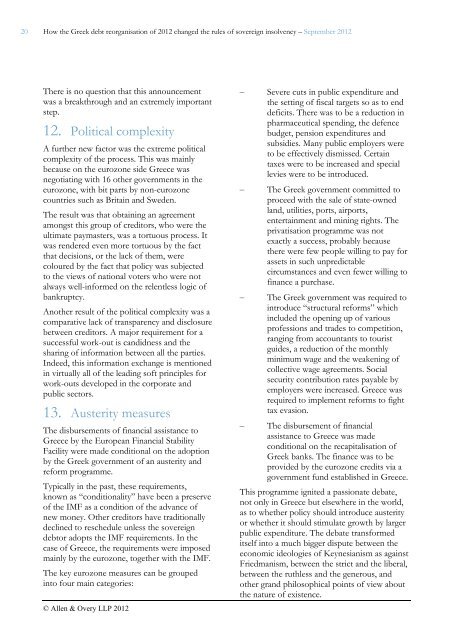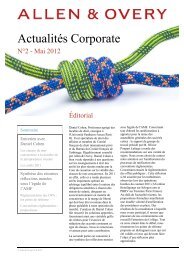How the Greek debt reorganisation of 2012 changed ... - Allen & Overy
How the Greek debt reorganisation of 2012 changed ... - Allen & Overy
How the Greek debt reorganisation of 2012 changed ... - Allen & Overy
You also want an ePaper? Increase the reach of your titles
YUMPU automatically turns print PDFs into web optimized ePapers that Google loves.
20 <strong>How</strong> <strong>the</strong> <strong>Greek</strong> <strong>debt</strong> <strong>reorganisation</strong> <strong>of</strong> <strong>2012</strong> <strong>changed</strong> <strong>the</strong> rules <strong>of</strong> sovereign insolvency – September <strong>2012</strong><br />
There is no question that this announcement<br />
was a breakthrough and an extremely important<br />
step.<br />
12. Political complexity<br />
A fur<strong>the</strong>r new factor was <strong>the</strong> extreme political<br />
complexity <strong>of</strong> <strong>the</strong> process. This was mainly<br />
because on <strong>the</strong> eurozone side Greece was<br />
negotiating with 16 o<strong>the</strong>r governments in <strong>the</strong><br />
eurozone, with bit parts by non-eurozone<br />
countries such as Britain and Sweden.<br />
The result was that obtaining an agreement<br />
amongst this group <strong>of</strong> creditors, who were <strong>the</strong><br />
ultimate paymasters, was a tortuous process. It<br />
was rendered even more tortuous by <strong>the</strong> fact<br />
that decisions, or <strong>the</strong> lack <strong>of</strong> <strong>the</strong>m, were<br />
coloured by <strong>the</strong> fact that policy was subjected<br />
to <strong>the</strong> views <strong>of</strong> national voters who were not<br />
always well-informed on <strong>the</strong> relentless logic <strong>of</strong><br />
bankruptcy.<br />
Ano<strong>the</strong>r result <strong>of</strong> <strong>the</strong> political complexity was a<br />
comparative lack <strong>of</strong> transparency and disclosure<br />
between creditors. A major requirement for a<br />
successful work-out is candidness and <strong>the</strong><br />
sharing <strong>of</strong> information between all <strong>the</strong> parties.<br />
Indeed, this information exchange is mentioned<br />
in virtually all <strong>of</strong> <strong>the</strong> leading s<strong>of</strong>t principles for<br />
work-outs developed in <strong>the</strong> corporate and<br />
public sectors.<br />
13. Austerity measures<br />
The disbursements <strong>of</strong> financial assistance to<br />
Greece by <strong>the</strong> European Financial Stability<br />
Facility were made conditional on <strong>the</strong> adoption<br />
by <strong>the</strong> <strong>Greek</strong> government <strong>of</strong> an austerity and<br />
reform programme.<br />
Typically in <strong>the</strong> past, <strong>the</strong>se requirements,<br />
known as “conditionality” have been a preserve<br />
<strong>of</strong> <strong>the</strong> IMF as a condition <strong>of</strong> <strong>the</strong> advance <strong>of</strong><br />
new money. O<strong>the</strong>r creditors have traditionally<br />
declined to reschedule unless <strong>the</strong> sovereign<br />
<strong>debt</strong>or adopts <strong>the</strong> IMF requirements. In <strong>the</strong><br />
case <strong>of</strong> Greece, <strong>the</strong> requirements were imposed<br />
mainly by <strong>the</strong> eurozone, toge<strong>the</strong>r with <strong>the</strong> IMF.<br />
The key eurozone measures can be grouped<br />
into four main categories:<br />
© <strong>Allen</strong> & <strong>Overy</strong> LLP <strong>2012</strong><br />
– Severe cuts in public expenditure and<br />
<strong>the</strong> setting <strong>of</strong> fiscal targets so as to end<br />
deficits. There was to be a reduction in<br />
pharmaceutical spending, <strong>the</strong> defence<br />
budget, pension expenditures and<br />
subsidies. Many public employers were<br />
to be effectively dismissed. Certain<br />
taxes were to be increased and special<br />
levies were to be introduced.<br />
– The <strong>Greek</strong> government committed to<br />
proceed with <strong>the</strong> sale <strong>of</strong> state-owned<br />
land, utilities, ports, airports,<br />
entertainment and mining rights. The<br />
privatisation programme was not<br />
exactly a success, probably because<br />
<strong>the</strong>re were few people willing to pay for<br />
assets in such unpredictable<br />
circumstances and even fewer willing to<br />
finance a purchase.<br />
– The <strong>Greek</strong> government was required to<br />
introduce “structural reforms” which<br />
included <strong>the</strong> opening up <strong>of</strong> various<br />
pr<strong>of</strong>essions and trades to competition,<br />
ranging from accountants to tourist<br />
guides, a reduction <strong>of</strong> <strong>the</strong> monthly<br />
minimum wage and <strong>the</strong> weakening <strong>of</strong><br />
collective wage agreements. Social<br />
security contribution rates payable by<br />
employers were increased. Greece was<br />
required to implement reforms to fight<br />
tax evasion.<br />
– The disbursement <strong>of</strong> financial<br />
assistance to Greece was made<br />
conditional on <strong>the</strong> recapitalisation <strong>of</strong><br />
<strong>Greek</strong> banks. The finance was to be<br />
provided by <strong>the</strong> eurozone credits via a<br />
government fund established in Greece.<br />
This programme ignited a passionate debate,<br />
not only in Greece but elsewhere in <strong>the</strong> world,<br />
as to whe<strong>the</strong>r policy should introduce austerity<br />
or whe<strong>the</strong>r it should stimulate growth by larger<br />
public expenditure. The debate transformed<br />
itself into a much bigger dispute between <strong>the</strong><br />
economic ideologies <strong>of</strong> Keynesianism as against<br />
Friedmanism, between <strong>the</strong> strict and <strong>the</strong> liberal,<br />
between <strong>the</strong> ruthless and <strong>the</strong> generous, and<br />
o<strong>the</strong>r grand philosophical points <strong>of</strong> view about<br />
<strong>the</strong> nature <strong>of</strong> existence.
















